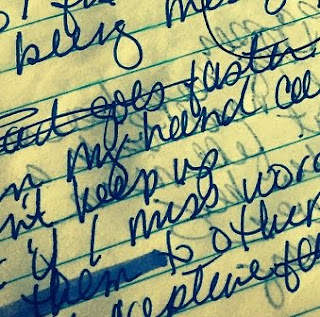Seeking Practice Over Perfect
Over
the years, I’ve come to understand perfection is a false master
regardless of the task. My perfect custard might look like your messy
pie. My perfect swan dive might be your belly flop. Perfection is
subjective. It’s as inaccurate a measure of success as coloring in the
lines is for creativity.
In her new book, The Lives We Actually Have, author Kate Bowler tackles the gremlins of perfection this way in one of her 100 blessings for imperfect days:
“ … In this culture of more, more, more, make me less. Less tidy and afraid, less polished and buttoned up, less prideful and judgmental. Turn down the volume of my expectations, and let me hear the birds sing…”
These beautiful words lead me toward thinking about practice, rather than perfect. How can we be less perfect and make time for more practice?
After years of being
tethered to that false master of perfection, I’ve learned being open to
the adventure that practice brings is freeing, encouraging, and often
surprising … if I turn down the volume of expectations, as Kate writes.
In
my daily life, I practice to finish something so I can try again. I
practice to expand my perspective and learn more. I practice to get
better and explore what’s next. My writing practice has sparked a
curiosity I didn’t know I had. My music practice has brought me a sense
of connectedness I never imagined at my age. My yoga practice has led me
to risk a handstand and hang from a yoga wall. All have given me a
satisfaction I wouldn’t have discovered if I had been seeking perfect
rather than embracing practice.
Writing practice
My
writing often involves taking rambling notes of observations with no
idea of what connect points may eventually arise. These notes may be
random words scribbled in purple ink on the back of receipts or emails I
send myself while waiting for the gas tank to fill. Just the practice
of capturing observations, turns of words or the echoes of people’s
stories gives me huge pleasure – not because I’m using them to write a
perfect best seller, but because they keep me curious.
The practice of writing is also calming. I can often tame the head
chatter clanging around like pinball marbles once I take a few minutes
to shoot them out through my fingers. If something insightful lands on
the page, great. If a connection to someone comes of it, all the better.
But
I know one thing for sure … I never want to perfect this practice of
writing because then I’d stop asking questions and discovering new
paths. Perfection is when the fun and discovery of it end.
Music practice
 |
| The blessing of my Sip N Strum crew |
Practicing music in a group also absorbs my imperfections. When enough of us are playing together, one person’s imperfect note can be swallowed up by the group. What a gift to practice without the worry of perfect.
Yoga practice
When I first started frequenting yoga classes, I thought the phrase “practice yoga” sounded a bit pretentious … and yoga isn’t supposed to be pretentious, right? At first, it often seemed the instructor who spoke the words “practice yoga” was a limber 20-something who didn’t get it was impossible for a middle-aged woman to practice herself into a back bend or headstand.
After several years of an increasingly frequent yoga practice and some very gifted and encouraging instructors, I now understand now why it’s called a practice. I initially saw yoga as striving toward an athletic goal like moving from a circuit of 30 to 40 to 50 squats. But I’ve discovered the real practice with yoga is the exact opposite of striving – it’s working from where you are at that moment.
Maybe today I can do a back bend, but tomorrow I may not even be able to touch my toes. That’s OK … just enjoy and finish today’s practice and come next time ready to practice again.
A commitment to finishing my practice so I can try again
In her book, Bird by Bird, writer Anne Lamott speaks
beautifully of practice and making a commitment to finishing (in this
case she’s talking about writing but it’s an apt observation for any
type of practice). “What you are doing may just be practice. But this is
how you are going to get better, and there is no point in practicing if
you don’t finish.”
But here finishing doesn’t mean perfecting.
It’s recognizing there’s always more to see, learn and discover if we
allow it and just keep practicing rather than striving for
that unreachable state of perfect.
I think I’ll stay on this path of practicing practice rather than practicing perfect for a while. It’s a lot more fun.




Comments
Post a Comment
I love hearing from readers. Let me know what you think! Please sign your name if you're not already signed into Blogger so I can see who is posting (otherwise it shows up as anonymous).